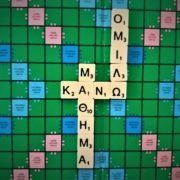A Greek Rebetiko song by Tsitsanis, brings us some decennia back in time, but stays also very contemporary.
Greeks, whenever they were facing difficulties, which is still something happening very often, have found a way to overcome and even to celebrate!
The following Rebetiko song, by known composer Vassilis Tsitsanis, is an example of how Greeks deal with difficulties!
Φαίνεται πως οι Έλληνες αντιμετώπιζαν δυσκολίες πάντα,αλλά είναι φανερό ότι έχουν βρει τον τρόπο να τις ξεπερνάνε και να διασκεδάζουν με αυτές! Το παρακάτω ρεμπέτικο είναι ένα παράδειγμα αυτού του είδους αντιμετώπισης προβλημάτων! Η φιλοσοφία του μπορεί να εφαρμοστεί από όλους τους ανθρώπους για να βλέπουν τη ζωή πιο αισιόδοξα!
About Vassilis Tsitsanis – Για τον Βασίλη Τσιτσάνη
He is one of the most important composers, musicians and singers of “rembetika and laika” songs of the 20th century.
According to him, he wrote his best songs during the period 1938-’45 . The difficulties inspired the composer.
Tsitsanis is often referred to, together with Markos Vamvakaris.
They are most likely the most known names as composers of ‘rembetica songs’
Music by V. Tsitsanis
lyrics written by Evtixia Papagianopoulou
Στίχοι: Ευτυχία Παπαγιαννοπούλου
Note; She has written many lyrics and is a very interesting person in Greek music history.
Click here for more info
++++++++++++++++++++++++++++
Greek Lyrics : (English translation below)
Είμαστε αλάνια,
διαλεχτά παιδιά μέσα στην πιάτσα
και δεν την τρομάζουν
οι φουρτούνες τη δική μας ράτσα.
Τι τα θες, τι τα θες, πάντα έτσι είν’ η ζωή
θα γελάς ή θα κλαις βράδυ και πρωί.
Κάθε μας μεράκι γίνεται τραγούδι και το λέμε
και μες στα στραπάτσα
μάθαμε ποτέ μας να μην κλαίμε.
Κι αν στην κοινωνία
μας χτυπούν αλύπητα οι μπόρες
Μέσα στο τραγούδι
φεύγουνε χαρούμενες οι ώρες
++++++++++++++++++++
English Translation:
We are bums,
special kids in the square
and our race is not afraid of storms.
Don’t ask why, don’t ask why
life is gonna be this way
sometimes laugh, others cry
be it night or day
Each of our desires becomes a song we sing
and among the misfortunes
we have learned never to cry.
Even if the rat race
constantly is soaking us with showers
when we pick up singing
cheerfully will go along the hours
Λεξιλόγιο – Greek vocabulary
(some slang is used in the song, and hard to translate…)
αλάνι = παιδί του δρόμου – a bum
πιάτσα = η πλατεία, ο χώρος της αγοράς – small square
φουρτούνα = τρικυμία, μεταφορικά η περιπέτεια – rough sea / adventure
ράτσα = η γενιά – generation / race
μεράκι = το πάθος, ο καημός
στραπάτσο = η ζημιά, ο εξευτελισμός
+++++++++++++++++++++++++
 If you would like to learn more about Rebetika music, with extra songs, lyrics, YouTube links, etc.. then click below for more information
If you would like to learn more about Rebetika music, with extra songs, lyrics, YouTube links, etc.. then click below for more information
Αν θέλετε να μάθετε περισσότερα για το Ρεμπέτικο, μπορείτε να κάνετε κλικ παρακάτω,
ώστε να βρείτε περισσότερες πληροφορίες για το eBook μας για το ρεμπέτικο τραγούδι.
+++++++++++++++++++++++++
If you want to listen to more songs of Tsitsanis, and learn about the period the songs were composed,
then you an also watch the following movie
Movie ; Ouzeri Tsitsanis
info at ; https://omilo.com/greek-movie-ouzeri-tsitsanis/
Ouzeri: a popular type of small Greek tavern, which serves “ouzo” (anise-favored aperitif) and “mezedes” (kind of Greek finger food).
The story of this movie is about the forbidden love between a Christian and a Jewish girl in Thessaloniki during the German Occupation. This love has to face the senseless racial discrimination and the Nazis regime. The story mainly takes place in Tsitsanis ouzeri, where the great Greek composer sings and composes.
The historical background
Thessaloniki fell to the forces of the Germans on April 9th, 1941. The German occupation in Thessaloniki is more brutal than in Athens.
The shops close at once. The black market is in its peak. It is the period of The Great Famine, mass starvation hits all the urban areas.
The Nazis soon force the Jewish residents into a ghetto and begin the deportation process of the city’s 50.000 Jews to the Auschwitz concentration camp by train.









